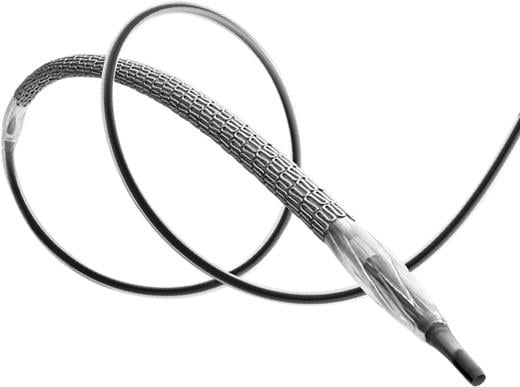
October 1, 2018 — Recent results from the BIONYX randomized clinical study showed the novel, thin-strutted, polymer-coated, zotarolimus-eluting Resolute Onyx stent to be non-inferior in X-ray visibility to the ultrathin-strutted, bioresorbable, polymer-coated, sirolimus-eluting Orsiro stent. Findings of the BIONYX trial were reported at the 30th annual Transcatheter Cardiovascular Therapeutics (TCT) scientific symposium, Sept. 21-25 in San Diego. The study was also published simultaneously in The Lancet.1
“The vast majority of contemporary stents use stent platforms from cobalt-chromium alloy, which allows for the creation of fine mesh tubes with satisfactory radial force but limited X-ray visibility,” said Clemens von Birgelen, M.D., Ph.D., an interventional cardiologist at Thoraxcentrum Twente and professor of interventional cardiology at the University of Twente in Enschede, The Netherlands. “Sub-optimal radiographic visibility can be challenging in obese patients, when treating bifurcated or calcified coronary lesions, or when carefully assessing stent expansion.”
The Resolute Onyx stent was developed in response to the demand for stents with better radiographic visibility, which may facilitate the recognition of stents that are not yet well expanded or incompletely apposed to the arterial wall. The stent uses a novel thin strut composite wire stent platform, covered with a zotarolimus-eluting durable polymer coating. The metallic stent platform consists of a composite wire made from a dense platinum-iridium core, which makes the struts radiopaque, and an outer layer of cobalt-chromium alloy. The dense core also allows for a somewhat lower strut thickness. A head-to-head comparison with the Orsiro stent was of interest, as the Orsiro has shown excellent efficacy and safety outcomes in multiple randomized clinical trials, including three large-scale trials in all-comers.
Between Oct. 7, 2015, and Dec. 23, 2016, a total of 2,488 all-comer patients were included in the intention-to-treat analysis. Participants were between 30 and 96 years of age, 594 (23.9 percent) were women, 1,765 (70.9 percent) presented with an acute coronary syndrome, and 1,275 (51.2 percent) were treated for an acute myocardial infarction at the time of study enrollment.
At one-year follow-up, the primary endpoint of target vessel failure was met by 55 (4.5 percent) of 1,243 patients assigned to Resolute Onyx, and by 58 (4.7 percent) of 1,245 assigned to Orsiro. Non-inferiority of Resolute Onyx versus Orsiro was established with an absolute risk difference of -0.2 percent (95 percent CI -1.9–1.4) and an upper limit of the one-sided 95 percent CI of 1.1 percent (pnon-inferiority=0.0005, psuperiority=0.77).
The rates of cardiac death, target vessel-related myocardial infarction, and clinically indicated target vessel revascularization were low and similar in both groups. Definite or probable stent thrombosis occurred in a single patient (0.1 percent) in the Resolute Onyx group and nine patients (0.7 percent) in the Orsiro group (HR 0.11 [95 percent CI 0.01–0.87], p=0.0112).
“Despite the difference in stent strut materials and thicknesses and the dissimilar durable and bioresorbable polymer coatings of the two study stents, the BIONYX study found no advantage for one stent over the other,” added von Birgelen. “Treatment with both stents was similarly safe and effective with excellent one-year clinical outcomes in a complex all-comer patient population. The observed very low stent thrombosis rate in Resolute Onyx warrants further clinical investigation.”
The BIONYX trial was funded equally by Biotronik and Medtronic. The sponsors had no access to the study database and no role in the study design, data collection, data analysis or data interpretation. The research department of Thoraxcentrum Twente has received institutional research grants from Abbott Vascular, Biotronik, Boston Scientific and Medtronic.
Click here to read about more late-breaking clinical trials from TCT 2018
For more information: www.medtronic.com
Reference
1. von Birgelen C., Zocca P., Buiten R.A., et al. Thin composite wire strut, durable polymer-coated (Resolute Onyx) versus ultrathin cobalt–chromium strut, bioresorbable polymer-coated (Orsiro) drug-eluting stents in allcomers with coronary artery disease (BIONYX): an international, single-blind, randomised non-inferiority trial. The Lancet, Sept. 22, 2018. DOI:https://doi.org/10.1016/S0140-6736(18)32001-4


 January 05, 2026
January 05, 2026 









